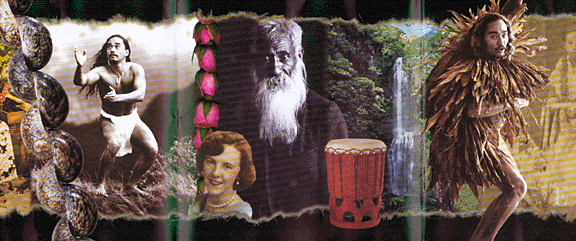


Kealii Reichel’s
E O Mai
A work of beauty, brilliance
By John Berger
Special to the Star-BulletinKeali'i Reichel's third album proves him again an unquenchable source of fresh contemporary Hawaiian music. Six of the 13 songs and chants are originals by Reichel or Puakea Nogelmeier. All are beautifully arranged. OK, so Reichel is one of the hottest acts in Hawaiian music. OK, so he has a national distribution deal with a major record label. The quality of his work here transcends all that. This is brilliance in its own right.
E O Mai, Keali'i Reichel, Punahele Productions
The central themes are sex, love, death, sovereignty -- and nematodes. Reichel's duet with the inimitable Kekuhi Kanahele makes "Nematoda" an easy standout. No woman currently singing Hawaiian music snarls and growls more seductively than Kanahele; it's an inspired pairing. (The liner notes explain that nematodes are parasitic worms that sap the vitality of plants, a term composer Nogelmeier uses to describe certain types of people as well).
"Patchwork Quilt," though not original, effectively expresses Reichel's feelings about the AIDS epidemic.
Reichel's sense of his Hawaiian political heritage is heard in two other English-language selections.
"Song of Sovereignty" was written and first recorded by Peter Apo and Jeff Rasmussen for the "Hawaiian Nation: A Call For Sovereignty" anthology in 1990. Reichel personalizes it beautifully.
"Ballad of the Broken Word" comes from composer Toshi Reagon. It combines the words from an 18th-century Hawaiian prophesy with an ominous contemporary warning: How fortunate it is for the powers-that-be that native Hawaiians are such a nonviolent people!
Reichel seems almost unique among contemporary Hawaiian artists in his ability to reinterpret mainstream pop-chart hits without resorting to synthesized sonic filler or pseudo-reggae rhythms. Vanessa Rodrigues joins him for a powerful reworking of "My Love is a Natural Thing" while "If I Had Words" (the theme from the movie "Babe") stands quite well as a beautiful piece of mainstream pop.
Yes, Reichel has impeccable credentials as a contemporary Hawaiian artist -- he sings haole music quite well, too.
Producers Reichel, Jim Linkner and Fred Krauss obviously spared no expense in putting this album together. They used a live string quartet where many local producers would have opted to cut costs by using use a synthesizer; live instruments predominate throughout.
Uluwehi Guerrero, Ho'okena, John Koko and Peter Moon add their talents at key points but never intrude on Reichel's performance. That too is a welcome touch of professionalism.